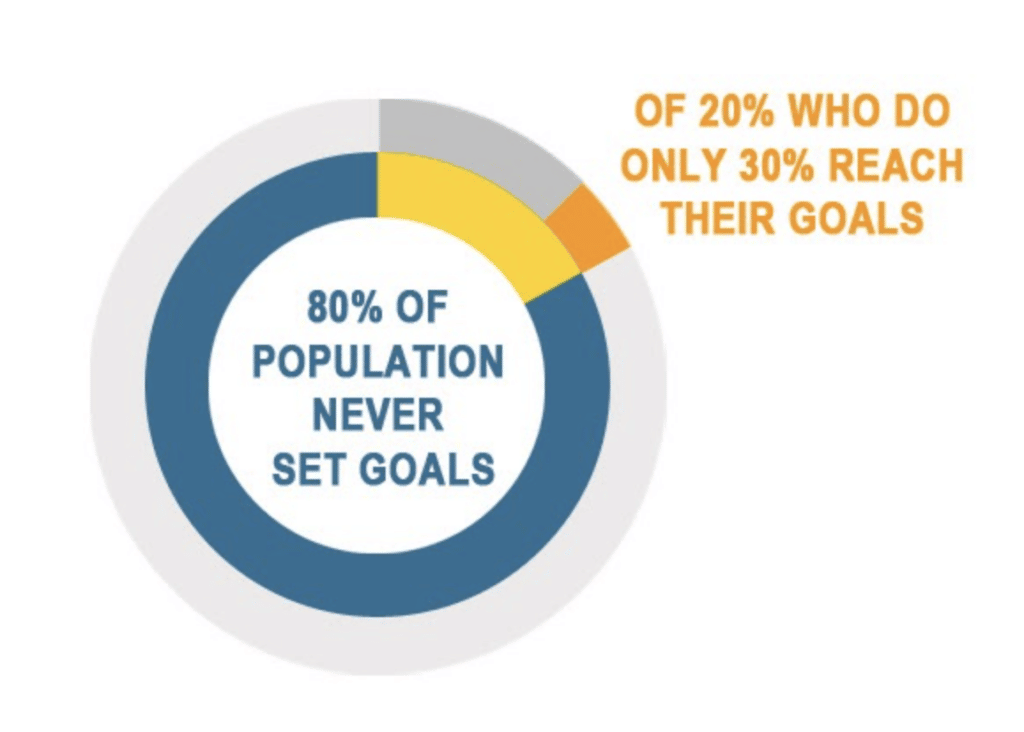Setting goals is an admirable exercise. On the surface, it makes you look organized, ambitious, and focused — all things that every entrepreneur should aspire to be. In fact, a Harvard Business Study found that only 14% of people actually bother with setting goals in the first place, but those who do are 10 times more successful than those who don’t.
But here’s a little dose of reality: goal setting is basically pointless if you’re not being realistic about the goals you want to achieve.
It’s not enough to simply set goals. That’s really the easy part. What sets a successful entrepreneur apart from the average goal-setter is being honest with yourself about the goals you can achieve, and then being able to go out and crush those goals.

Stop being a goal setter — here’s how to be a goal crusher:
Believe You Can
There’s something to be said about a powerful mindset. You need to be your own cheerleader when you’re setting goals. Even if you have others around you that want to see you succeed, it’s ultimately up to you to make it happen.
This means believing in yourself. If you can’t buy into your own ambitions, then you’re likely going to fall short of your goal. Break down your goal into smaller steps that you truly believe you can handle. If something seems out of reach to you, step back and ask yourself why.
Perhaps you don’t have all the tools or knowledge you need to achieve that goal. Or maybe it seems too complicated based on current circumstances. Whatever it is that’s holding back your faith, see how you can address it so you can give your goals your unwavering commitment.
Remember, everything you see happening around you started as someone’s goal. There’s a lot that can be achieved in this world, including whatever it is you set out to do (as long as you believe you can).
Write Down Your Goals
You’re 42% more likely to achieve your goals when you write them down. That’s a pretty powerful factor given how little effort it takes to put pen to paper.
Studies suggest that writing down goals forces you to get clear on what you really want. It’s not just some vague idea that popped into your brain, but an actually fleshed-out thought that requires you to ask yourself questions and start planning your strategy.
Plus, when you write down your goals and keep them in a place that you see often, your goals stay top of mind and are more likely to maintain their importance. It’s easy to think of a goal, not write it down, and then start feeling less hopeful or excited about it. But when you take that extra step of writing it on paper, you’re adding a level of realness to it that can help you define your commitment to it.
Set Goals You Can Measure
I want to lose weight.
I want to start a business.
I want to make more money than I was making when working for someone else.
These three statements have something in common ― they’re all pretty vague.
Losing weight could be a pound or 50 pounds. Starting a business begs a number of questions: What kind of business? How will it make money? Where will it be?
As for making more money, that’s kind of like saying you want to lose weight. How much more money do you really want to make? An extra $50 a year isn’t likely to wow you. An extra $10K or more? Now that might be worth exploring.
When you’re developing goals, you need to be specific about what you’re going for. This way, you’ll know if you hit or miss the mark. Plus, you can look at the specific end result to see if it’s truly within your reach or whether you might need to adjust.
Understand Your Motivations for Achieving Your Goals
Setting goals simply for the sake of setting goals isn’t doing you any favors. Your goals should inspire and motivate you. The outcome needs to excite you. They need to hold value and be important to you. Because when they are, you’re far more likely to take the necessary steps to achieve them instead of letting them simmer in your brain.
When you set goals that aren’t really part of your big picture plan, you are probably going to be less motivated to tackle them. But when your goals relate to something bigger you want or something important to you, you’ll feel a greater sense of urgency to step up and take on those goals instead of putting them off. When you don’t meet your goals, you could end up feeling disappointed and frustrated with yourself, both of which are not helping you stay motivated.
Consider Your Resources
Last but not least, being realistic about your goal setting means thinking holistically. Look at all of the available resources you’ll need to achieve your goals: time, money, knowledge, and experience. When one or more of these resources is missing, you could be setting yourself up for failure.
That’s NOT to say you can’t get these resources in order to achieve your goal. If you need money, you could start a side hustle to fund your venture. If you need more time, you could start outsourcing tasks to free up room in your schedule. If you don’t know something that you really need to know, check out free YouTube videos or pay for a course.
Lack of resources can be an obstacle, but you may be able to find a helpful way past that obstacle and make your goal a real possibility.
Wrapping It Up
Goal setting isn’t something that needs to be reserved for New Year’s Eve. You can decide today to set a goal to improve your life. However, make sure that your goal is specific, measurable, achievable, realistic, and has a timeframe attached.
And perhaps more importantly, make sure that the motivation behind your goal is inspiring enough to get you through the tough times. Any worthy goal won’t happen overnight. Make sure you are committed to the process and you will see amazing things happen.
For more goal-setting inspiration, head back to my blog.






4 Responses
Oh my, I was not aware of those statistics! As someone who loves setting goals I find it quite puzzling that 80% never do!